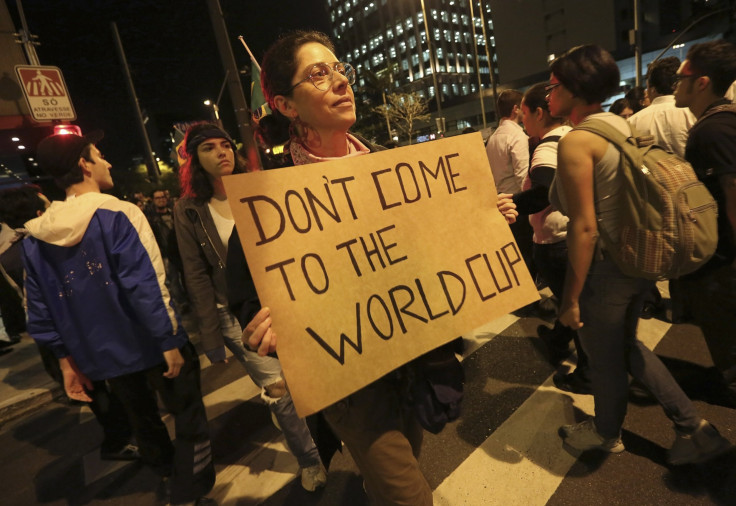Brazil’s Protests Threaten World Cup Over Claims Of Overspending From Government; Is The Soccer Competition Harming Brazil?

Brazil has marked a milestone this week: its very first social upheaval. In a country where massive protests were unheard of, what began as a pacific demonstration against the rise in the price of bus tickets has escalated into an unprecedented series of protests, vandalism, violence and police crackdowns, and international attention.
The movement, which now has mobilized around 200,000 people in some of the major cities in Brazil, had been focusing on making complaints known to authorities, grouping in front of official buildings and in central avenues. But the target changed on Sunday, when protesters in Rio de Janeiro and Brasilia took to the streets near stadiums while games for the Confederation Cup -- a trial run for the World Cup -- were being disputed. That's a major step in Brazil, arguably the world's most soccer-crazed nation, where the sport has nothing short of a religious following.
Protesters claim that expenses in preparation for the World Cup were double the budget, and that the extra money came from funds reserved for education, healthcare and public transportation. The masses that blocked Mané Garrincha stadium in Brasilia and Maracanã in Rio de Janeiro hoisted signs that read “We do not need the World Cup. We need money for hospitals and education” and chanting slogans such as “The people have awakened” and “Pardon the inconvenience, Brazil is changing.”
President Dilma Rousseff, who was booed while attending the Confederation Cup opening game in Brasilia, said the protesters are being heard. “The direct message from the streets is for more citizenship, better schools, better hospitals, better health, for direct participation,” she said in a televised address to the nation. “My government is trying and committed to social transformation.”
Rousseff’s approval rate, which had been at a steady 75 percent since her victory in 2010, has decreased by 8 points since the protests begun. Many Brazilians also blame the government for the police’s violent response, which included tear gas and rubber bullets, and left more than 250 injured in Sao Paulo.
In a country as soccer-mad as Brazil, turning against the people’s biggest passion means a huge level of dissatisfaction. Brazil is set to host its first World Cup in 2014, and then the Olympics in 2016. Both sporting events are expected to bring in foreign investment, sponsorships and tourism -- but how beneficial are these events for their host countries?
University of Maryland sports economist Dennis Coates argued that in spite of the perception that hosting the World Cup will be a boon for the host’s economy, the event will in fact cost the country billions of dollars. “There is no evidence that the benefits promised by event organizers have ever materialized,” wrote Coates. He offered the example of the 1994 World Cup hosted by the U.S., when the Bid Committee predicted a benefit of $4 billion for the country, but later found that “the average host city experienced a reduction in income of $712 million relative to predictions,” resulting in an overall negative impact on the host city economies of $9.26 billion dollars.
This negative effect is even more noticeable in struggling economies. By the end of 2010, South Africa had only regained $505 million of the $4.5 billion it invested in building stadiums and infrastructure for the Cup it hosted that year, according to official figures.
The Telegraph reported that the country expected a boost of $900 million from tourists flocking to attend the event, but that failed to materialize. South Africa’s Tourism Minister Marthinius van Schalkwyk said only 209,000 foreign fans attended the tournament, as opposed of the 450,000 expected.
The website Soccerlens pointed out that the general assumption is that hosting a World Cup is good for a country for the aforementioned expected increase in tourism, the jobs it will create, and the investment, but that is very far from what typically happens. The investment in infrastructure and the opportunity cost (the money invested that could go somewhere else) cancel out the revenue.
Who, then, wins in this game? According to Coates, it is the Fédération Internationale de Football Association (FIFA, in English the International Federation of Association Football) making the biggest profit. The organization helps the host country in the initial investment, but usually leaves the place with a much bigger sum. In South Africa, FIFA gave $482 million to assist with the hosting, leaving the developing economy to foot the rest of the total $4.5 billion bill -- but the organization left with a $1.9 billion profit, made primarily via sponsorship deals.
“So while South Africa are likely to be counting the costs of hosting a tournament that was supposed to help their economy, FIFA came away from Africa with their pockets full,” wrote Coates.
According to British investigative reporter Andrew Jennings, the Brazil protests have at their core a profound distaste for this state of affairs. “[Protesters] are targeting the nexus of business and political corruption and FIFA corruption,” said Jennings, who has been investigating corruption in sporting institutions for decades. “The corrupt FIFA president Sepp Blatter can be blamed for allowing the costs of new stadia to swell.”
Jennings mentioned former head of Brazil’s soccer federation Ricardo Teixeira as the reason Brazilians have turned to soccer to make their demands heard. Teixeira, who ran the Brazilian soccer federation as its president for two decades and was overseeing the organization of the World Cup, resigned in March of last year over accusations of bribery, corruption and tax evasion.
Follow me on Twitter: @PReyMallen
© Copyright IBTimes 2024. All rights reserved.





















